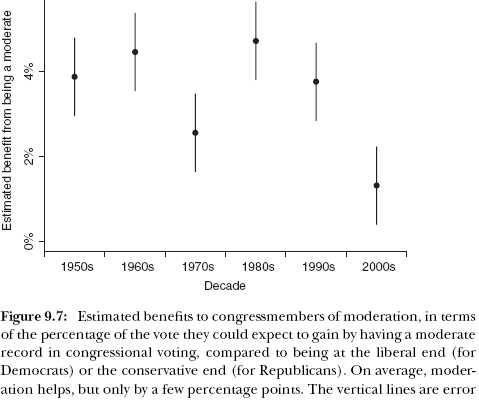Being Moderate Doesn't Always Pay Off at Election Time
Matthew Yglesias remarks that, when staking out positions, congressmembers are not very strongly constrained by the ideologies of their constituents.
Wow, that was a lot of big words. What I meant to say was: Representatives and Senators can pretty much vote how they want on most issues, whatever their constituents happen to believe. Not always, of course, but a representative can take a much more liberal or conservative line than the voters in his or her district or state, and still do fine when election time comes.
Yglesias gives some examples from the U.S. Senate, and I just wanted to back him up by citing some research from the House of Representatives.
First, here's a graph (from chapter 9 of Red State, Blue State; the numbers are based on research with Jonathan Katz) showing that, when running for reelection, it helps for a congressmember to be a moderate -- but not by much:
Being a moderate is worth about 2% of the vote in a congressional election: it ain't nuthin, but it certainly is not a paramount concern for most representatives.
To look at this another way, here's a graph showing the members of the House of Representatives in 1993-1994:
Representatives from more politically extreme districts tended themselves to be further to the right (if Republicans) or to the left (if Democrats), but only slightly so, with a lot of exceptions. There's a lot of leeway on where politicians stand.
(And, yes, many of these Democrats did lose in 1994 -- but, pretty much, the ones that lost were those in marginal districts, not particularly those with extremely liberal ideologies. By this I'm not trying to say the extreme liberals benefited from their ideology -- as noted above, I estimate that it hurt them by, on average, a couple percentage points of the vote -- but that these couple percentage points didn't really matter much; the partisanship of their districts was much more of the key factor in determining whether they were reelected.)
More discussion here, in the context of the notorious "median voter theorem." As I wrote earlier, I am sympathetic to the related point that it can be a mistake to assume that politicians of your political party agree with you, deep down, on the issues, and that they're only voting differently because of expedience, craven political calculation, or whatever. It's worth considering the hypothesis that lots of Democratic politicians do not share the values and policy preferences of lots of Democratic voters, and similarly for the Republicans. Given the diversity of public opinion, this really has to be true on some issues, and it very well might be true all over the place.
Another way of saying all this is: Incumbent congressmembers almost always win reelection. And, when they don't, they're often losing as part of a national swing (as in the 1994 Republican sweep or the 2006/2008 Democratic shift). And when an incumbent does lose unexpectedly, it can be for something unrelated to their votes (remember the "check kiting scandal" of 1992?).



